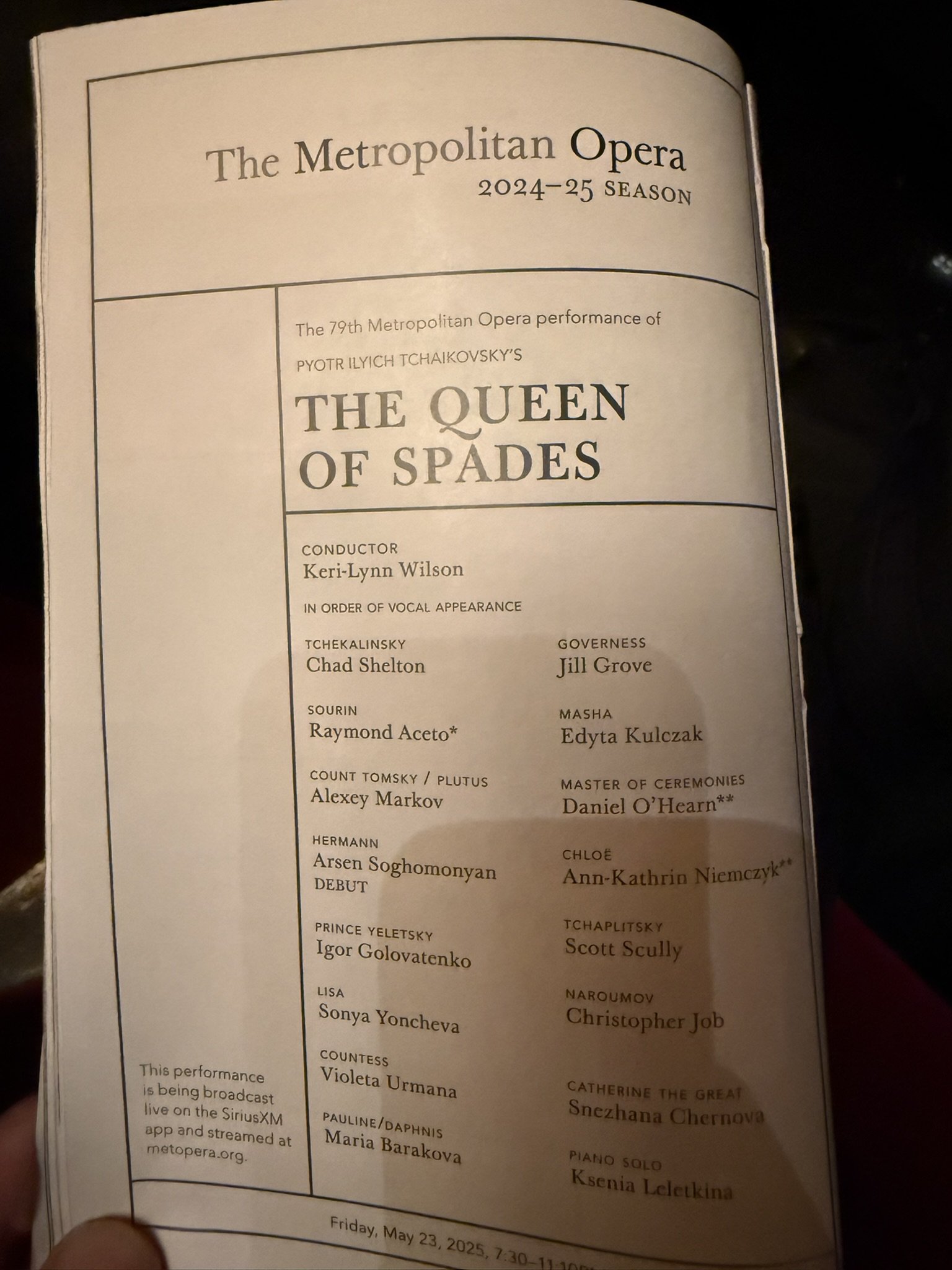Queen of Spades at Met Opera. A natural phenomenon in the aristocratic society at the end of the 18th century. Herman, who is addicted to gambling, uses Lisa, who he loves, to find out the secret of the cards from the Countess, betraying Lisa's feelings, and she takes her own life. Herman loses the gambling and commits suicide with a pistol. The final chorus of prayers for his tortured soul is tear-jerking. It is a story of losing purpose in a world that is constantly in flux, being seduced by immediate desires and ending one's life. Herman's writhing feelings, driven by a different passion, are replaced with love, and he sings to Lisa, "You are an angel." His passionate writing draws in Lisa. In the second act, her fiance, Yeketsky, sings "I love you" with dignity, sincerity, kindness, and passion. The contrast between these two loves is irresistible. The two singers beautifully portrayed the differences in the characters. The Russian folk songs in the scene with Lisa and her friends in the park, the singing and acting of Countess Violetta Urmama's monologue, and the children's chorus were all wonderful. And the gorgeous and magnificent chorus was terrific, as it well expressed the corrupted aristocratic trend of the time. However, Herman's inner anguish and suffering, the muddy timpani beats, and the dry or tired dragging tones of the flute and bassoon were entangled with the singing and riveted the hearts of the listeners. In the final scene with Herman and Lisa, when Herman betrays Lisa's heart, confesses his ambition to gambling, and runs away, the death march of Herman, who sold his soul to the devil, resounds from the double basses and brass on both sides, and in despair, Sonya Yoncheva, who plays Lisa, distorts her face, turns around, and disappears into the back of the stage. Tchaikovsky, who could not publicly admit his homosexuality, portrayed the protagonist as someone who, in his unrequited love for a singer who sang Germanic songs at the time, uses his love for Lisa to drive himself to self-destruction through gambling ambition. That's what I thought when I watched the conductor Wilson’s interview, and she portrayed that world.
18世紀末の貴族社会に蔓延する自然現象。賭博に溺れるヘルマンは、愛するリサを伯爵夫人からカードの秘密を探らせようと利用し、彼女の気持ちを裏切り、リサは自ら命を絶つ。賭博に敗れたヘルマンは拳銃自殺を遂げる。苦悩する魂への祈りが込められた最後のコーラスは、涙を誘う。常に変化し続ける世界で目的を失い、目先の欲望に翻弄され、自ら命を絶つ物語。かつてとは異なる情熱に突き動かされたヘルマンの悶え苦しむ感情は、愛へと変わり、リサに「あなたは天使だ」と歌いかける。彼の情熱的な作風はリサを惹きつける。第二幕では、婚約者エリツキが、品格と誠実さ、優しさ、そして情熱を込めて「愛している」と歌う。二つの愛の対比が抗しがたい魅力を放つ。二人の歌手は、登場人物の相違を見事に演じ分ける。公園でリーザと友人たちと過ごす場面のロシア民謡、ヴィオレッタ・ウルママ伯爵夫人の独白の歌唱と演技、そして児童合唱はどれも素晴らしく、特に豪華絢爛な合唱は、当時の堕落した貴族社会の風潮を巧みに表現していて、まさに圧巻。しかし、ヘルマンの内面の苦悩と苦悩、濁ったティンパニの音、そしてフルートとファゴットの乾いた、あるいは疲れたような引きずるような音色が、歌声と絡み合い、聴く者の心を釘付けにした。ヘルマンとリサとの最後の場面、ヘルマンがリサの心を裏切り、賭博への野望を告白して逃亡する場面では、悪魔に魂を売ったヘルマンのデスマーチが両脇のコントラバスと金管楽器から響き渡り、絶望の中、リサ役のソニア・ヨンチェヴァは顔をゆがめ、くるりと振り返り、舞台奥へと消えていく。同性愛を公に認めることができなかったチャイコフスキーは、主人公を、当時ゲルマン役の歌手への片思いの中で、リサへの愛を賭博への野望によって自滅へと追い込む人物として描いた。指揮者ウィルソンのインタビューを見て私はそう思ったし、彼女はその世界を描いていた。

